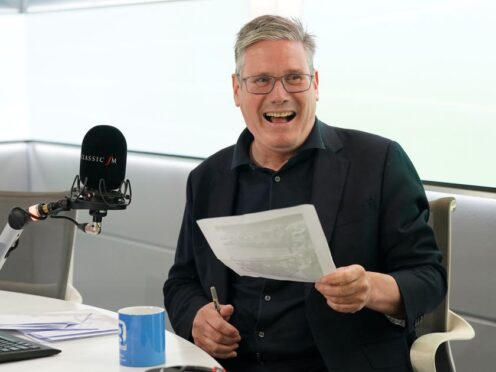
Sir Keir Starmer has been urged to boost jobs, growth and opportunity in the UK music industry following Labour’s general election victory.
Tom Kiehl, chief executive of UK Music, the trade body which represents the collective interests of the UK music industry, called on the “music-loving” Labour leader to help reverse the decline in music teachers and bolster the sector.
He said: ”UK Music sends its congratulations to Sir Keir Starmer and his team on their election victory, which gives his new government a resounding mandate for change.
“The incoming Labour government has been elected on a platform to implement a plan for the creative sector as part of its industrial strategy. The potential of the UK music industry to contribute to growth must be at the heart of this plan.
“The music industry is facing a number of challenges, but also opportunities. A strong relationship between UK Music and the new government will be essential to navigating what the rest of this decade brings.”
Kiehl said Sir Keir, who recently attended Taylor Swift’s Eras Tour, is “without doubt a music-loving PM”, referring to the fact he played the flute, piano, recorder and violin as a teenager and attended the Guildhall School of Music.
He said: “He has an immense passion for music. It is in his DNA. He fully understands the joys music can bring and, just as importantly, the huge challenges our sector faces.
‘Swift’ campaign pitstop. pic.twitter.com/VdSo7Pb0i5
— Keir Starmer (@Keir_Starmer) June 21, 2024
“We share his passion and the music industry is keen to continue working with him to ensure everyone can benefit from the important life skills that learning a music instrument with the help of brilliant teachers can bring – as Keir himself has acknowledged.
“We have lost 1,000 music teachers from our secondary schools since 2012. That poses a huge risk to the talent pipeline on which our sector relies and deprives thousands of young people of an enjoyable and rewarding career.
“We will work with the members of the new government – which has promised to recruit 6,500 new teachers – and strive to reverse that damaging decline.
“As the collective voice of the music industry, UK Music already has strong links with Sir Keir’s top team. Our plan is to continue to build on those relationships and work across the political spectrum, including the many newly elected MPs, to deliver real change and further growth for our world-leading sector.”
Gee Davy, interim chief executive and chief policy officer of the Association of Independent Music (AIM) added: “We look forward to working alongside all newly elected MPs and the new cabinet, to achieve the goal of making the regions and nations of the UK the best places to grow and scale a music business and build sustainable careers in music.
“With the election completed, our new government must get to grips with the performing arts and entertainment, a critical sector for the UK’s long-term success.
🧵1/4
— Equity (@EquityUK) July 5, 2024
“Key measures will include finally including music in the creative tax reliefs on par with those in film and gaming to encourage investment in our world-beating UK music scenes, opening up small business opportunities in apprenticeships, and encouraging responsible development in AI which protects and nurtures UK music and musicians.
“We encourage all MPs to consider the important place music has had in their lives and constituencies and look to them to support independent music businesses and creative professionals who are essential to the future of brilliant and diverse great British music.”
Paul Fleming, general secretary of performing arts union Equity, called on the new government to “get to grips” with the entertainment sector.
He added: “We’ll be pressing the new administration to set out a long-term plan for UK arts funding to reach the European average, to tackle the high upfront fees charged by casting directories, to make Universal Credit fairer for freelancers, to ensure public subsidy only supports work on decent union terms, and to fight for better rights in the video games and TV commercials sector.
“There are no creative industries without this incredible workforce. It’s time politicians stand up and offer them the same recognition that is offered by audiences across the world.”

Enjoy the convenience of having The Sunday Post delivered as a digital ePaper straight to your smartphone, tablet or computer.
Subscribe for only £5.49 a month and enjoy all the benefits of the printed paper as a digital replica.
Subscribe